Thank you to the Whyte Museum of the Canadian Rockies for granting permission to the Park Warden Service Alumni to post this interview on our website
This Oral History interview was funded in part by a research grant received in 2019 from the Government of Alberta through the Alberta Historical Resources Foundation.
Oral History Interview with Gord Peyto
Golden, B.C. April 3rd, 2019.
Interviewed by Mary Dalman
Phase 8 Oral History Project
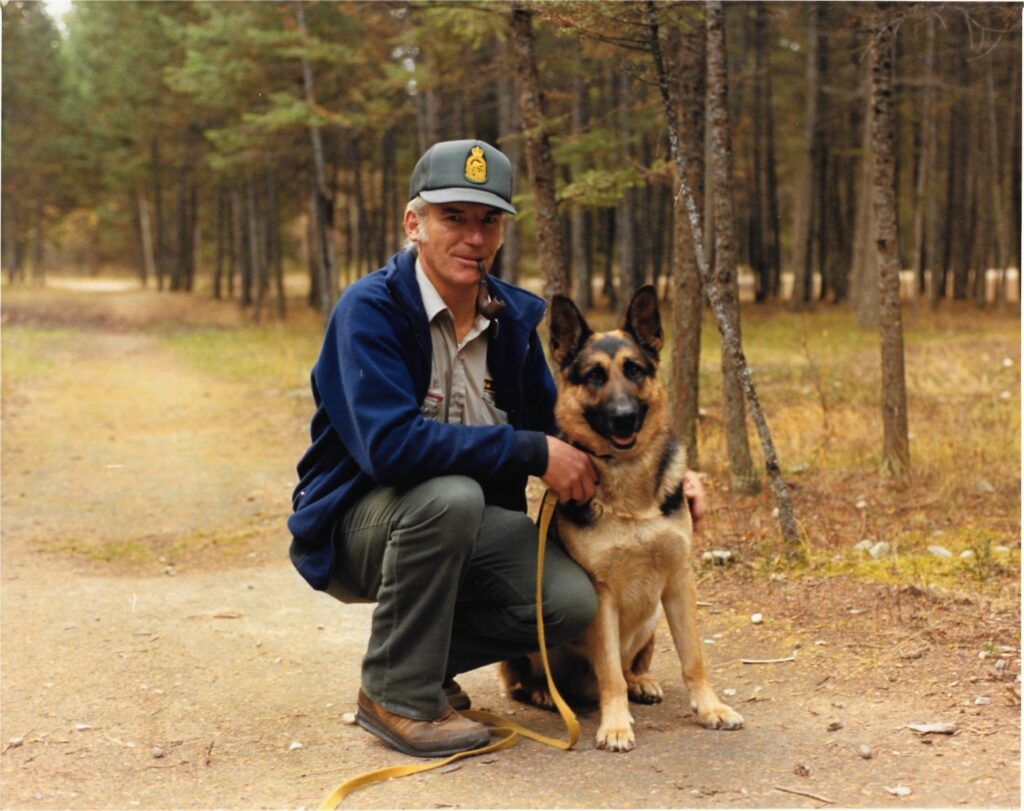
MD: This is an interview with Gord Peyto, and we’re in Golden, and it’s April 3, 2019. So, thanks a lot, Gord – we appreciate you coming and getting together here in Golden. Can you tell us your place and date of birth?
Gord: I was born in Banff, 1948.
MD: Where did you grow up?
Gord: Banff. I graduated from high school and went to work for the wardens. Out of school in June, and into the warden service – trail maintenance in July. I was 18, and it was June of 1966. And then part way through the trail crew, we were working on Bourgeau Lake trail, and I got sent off to Andy Anderson at the head of the Red Deer Lakes as a seasonal warden. Started in there at the start of August. I was just on the trail crew for about 4 weeks on the power saw, and then I got shuffled off there. Andy Anderson was my first boss, and we didn’t have a truck – we just had horses. And it was kind of interesting, because when we rode into the Cyclone, Andy and I went in there, and Barb was already in the cabin. And as we were going in, Andy says, “Oh, by the way, we’re having roast beef tonight – how do you like your meat?” And I said, “Oh – I like it medium rare.” So Andy says, “Well – that’s good, because that’s the way we like it too!” We got into the cabin – I’d just got off the horse, and Barb comes running out of the cabin, and says, “Hello! I’m Barb, you’re Gord, and how do you like your meat?” And I said, “Really well done!” And Andy’s pipe fell out of his mouth, and he said, “This is going to be a good summer!” And then it just went on from there. It worked out really well. That was the start of the whole thing.
MD: Did you stay in Banff (NP) very long?
Gord: Well, I stayed there, and then that winter I worked for warden maintenance – up the Cascade fire road, and the Spray Lakes – logging, or whatever, pushing snow. And then in the spring, I was a seasonal warden in Banff townsite. Walter Perren was the Alpine Specialist at the time, and that was the year that he was sick with leukemia. And Willi (Pfisterer) always said that I didn’t go to his funeral, but that was because I was the only warden working in Banff, Jasper, Yoho, and Kootenay. There was one guy on duty, and that was me! And everybody else was at the funeral, which was a tip of the hat to (Walter) – he was a very well respected gentleman.
MD: Was he the first Alpine Specialist for Parks?
Gord: Yup – he was the one brought in to make mountaineers out of cowboys. And he did a good job of it too.
MD: What made you want to join the warden service?
Gord: It’s kind of in the family. My grandfather, Walter, was a warden, my great-uncle Bill was a warden, and my Dad, Stan, worked for the maintenance – he was a Mechanical Supervisor, and it just kind of fell into place. We used to go out to all the Warden Districts, fixing the lighting plants and stuff, when we were kids, and we could run a D2 Cat, or a D4 Cat when we were 5 or 6 years old. So we knew the area.
MD: So was Bill Peyto your…?
Gord: Great-uncle. And Walter Peyto – he was the town warden in Banff for most of the time, and they used to call him “SpyPeyto”. One time he had 75 BB guns and 22’s that he had confiscated off of various kids. He phoned the school, and said, “Tell those kids they can come and get their guns back.” But before they got them back, he had taken them all to the blacksmith, and bent the barrels down in a U-shape, so they were rendered useless! But that was then and this is now.
MD: Did you always work in Banff?
Gord: No – I started in Banff, and then went to Waterton for three summers as a seasonal, and then I left Waterton, and went and worked in Rogers Pass for the Snow Research and Avalanche Warden Section for one winter. I left there in the spring, and said, “Goodbye, Roger’s Pass – I won’t see you again!” And that fall I was transferred to Revelstoke/ Glacier permanently. And so that started the Roger’s Pass episode.
MD: Is that where you first met Keith Everts?
Gord: Yes – I first met him there when my brother was working there in ’67 – Paul was working for Snow Research, and Keith was working for the National Research Council with Peter Schearer.
MD: Of all the parks, do you have a favourite?
Gord: Well, when you look at everything, I moved out of Banff in 1967 because it was just too damn busy then – in my opinion. I spent the majority of my career in Rogers Pass, and really enjoyed it. It’s the best skiing in the world, and that’s where it worked out for me. I did spend a little bit of time in Jasper. I left Glacier in the summer of ’72 or ’73, and then I went to Jasper and stationed at the Columbia Icefields, and worked for Abe Loewen. And Hans Fuhrer and I – we got along really well. So we were in the backcountry quite a bit, but Abe was the new breed, and I was still the old breed. I was in the Brazeau, and I had a phone message to phone Larry McGuire, the Chief Warden in Revelstoke / Glacier, so I come out of the Brazeau, and drove into Jasper, phoned him up, and Larry said, “I’ve got an opening for you – would you come back.” So I did. And then I never left again – the second time I went to Rogers Pass I went with a totally different attitude, and rather than picking up that “we’re not happy to be here” attitude, I went there with a “this is where I want to be” attitude, and it worked out well for me. That’s when we got organized with Willi Pfisterer – and started the Deep Snow School, which went on for several years, and I never did graduate from! A lot of guys didn’t! And we picked up some really good skiing. It was a reward for a lot of the guys that were doing all the callouts and the mountain rescues and everything else. You kind of got a week’s holiday, so to speak. And some guys had to work hard to survive it (the snow school) too! Willi Pfisterer ran all the schools, and he was based in Jasper. When Walter Perren died, Peter Fuhrmann and Willi Pfisterer – they split it up. Willi looked after Jasper, Waterton, and Revelstoke / Glacier, and Fuhrmann got Yoho, Kootenay, and Banff. And then it kind of went from there.
MD: What were some of your main responsibilities over the years?
Gord: A lot of it was Public Safety – fires, car accidents, avalanche accidents. When I got into the dog section, it was 1980, and I stayed there until I retired. (Gord was the dogmaster for Rev/Glacier). I had three dogs, and Max was the first one – a German Shepherd. And then Saxon, another German Shepherd, was the second one. I trained the first one in 1980, and the second one in 1985. And the third one in 1991 was a Belgian Tervuren. All three of them were really good dogs. We trained with the RCMP – they trained us with the dog business, and we trained them in the winter mountaineering and avalanche rescue business. So we had a really good mutual understanding, and it went really well – until Ottawa got a hold of it and almost screwed it up. We pulled it out of the fire and managed to save it.
MD: What were they doing?
Gord: They wanted to get their little fingers into the pie, because we had an arrangement between Western Region and the RCMP dog training section, and it went very well. They trained Alfie Burstrom the first time, and then when they expanded, Jack Woledge in Banff, and Earl Skjonsberg in Banff, and everything was going along fine, and then somehow Ottawa got wind that we were doing something, and the mucky-mucks kind of almost mucked it up. But we managed to pull it out. They didn’t know what was going on (here). Anyhow, it’s still an ongoing program which is good.
MD: When I was there (in Banff), the dog master was Scott Ward, then Mike Henderson.
Gord: Mike Henderson followed me around – we were on a search in Yoho for this guy that fell off the Burgess Shale? That was an interesting time, and I think he (Mike) got in shortly thereafter. That was getting near the end of my career. It was hard to find a guy that went off by himself, and we didn’t know if he was climbing, ice climbing, or what he was doing. He was staff at the Emerald Lake Lodge. Anyhow, it was a three-day search, and we finally got him tracked down – found his ski poles in the slide, and I figured we had him – slowly we found bits and pieces of him, but it took a while. Lance Cooper was the pilot – it was interesting – we were be-bopping from avalanche to avalanche trying to locate this guy.
MD: He was OK?
Gord: No – no, he was dead. We finally got enough pieces to write him off. Just one of those things that happened.
MD: You saw a lot…in that business.
Gord: (back to main responsibilities), A lot of avalanche work, stuff like that. Public safety mainly, and a smidgen of law enforcement.
MD: And what did you like about being a warden?
Gord: What I really enjoyed to begin with, was when I started, everybody had their own District, and every District warden looked after his District like it was his own personal ranch. He knew everything that was going on in it, and around it. In my way of thinking, it was a pretty good deal. Also, with the National Parks at that time, every Park had their individual sign shop with individual signs, and each Park stood out differently from the next Park. And there was a certain pride of craftsmanship and style in all of them. And to me, that made things pretty good. And then we went into the new design, and it’s totally generic. Just going sideways…(talking about the Districts) Well, that’s how I started to get to know all the different Districts and stuff, was because every District had their lighting plant, and they had to be maintained too – for the houses – electricity, bridges, and all that. My Dad would go check on the plants, and we’d go with him – because they were still working Saturdays, and you can’t be in school on Saturdays. One of my favourite places – Pete Tasker was the warden at Bow Summit, and we used to go there. He always had a D2 Cat in the wintertime to plough the snow, so Dad would fix the lighting plant, and we’d run the Cat, and push snow everywhere, whether it needed to be pushed or not! Those were different days. That would have been back in the ‘50s.
MD: Is there anything you didn’t like about being a Warden?
Gord: Centralization, changes at the end…When I started, you didn’t get paid a hell of a lot of money to do what you were doing, but a lot of people DID pay a lot of money to do what you got paid to do – if you sort of think about it that way. Near the end of my career, the way everything was changing, and I had a chance to get out when I was 50 years old, and Mike McKnight and I had this little discussion. And McKnight told me, he says “ There’s no way they’re going to let you go at 50, because they want that dog and you around!” He said, “I’ll be outta here!” And the way things worked out, they didn’t let McKnight go and I got gone! I left in 1998 after 32 years service. 18 years of it was with the dog section, and I retired from Rev/ Glacier as the dogmaster. And that’s just when the sidearm issue and all this bullshit was starting up. We always managed to work around things before, like – there’s a lot of things that a lot of people don’t know, but it’s better getting tried by 12, than carried by 6, so you figure it out at the end.
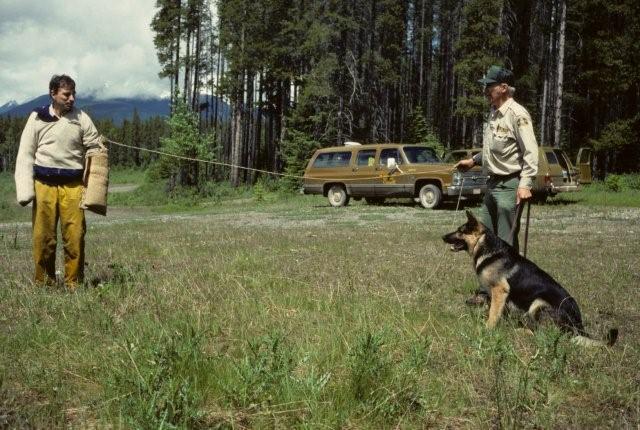
Dog Master Scott Ward with Dog Master Gord Peyto on a training exercise.
MD: What were some of the more memorable events of your career?
Gord: There were a lot of fun things; there were a lot of drastic things too. I was on several bear maulings. The first one that happened – was staff from the hotel, the girl got nailed by the bear. The bear was below the trail, and the cubs were above, and the sow came up and jumped on her back, and bit her in the shoulder – Malcolm Aspelet was the guy and he jumped on the bear’s back, and poked him with a belt knife, and so the bear turned around and did a number on him. Barbara managed to get up and get down and reported it to the Warden Office. So we went up there, and located Malcolm. And he was below the trail in the slide alder and we managed to get down to him, and the first big mistake I made was I didn’t know the guy’s name until I got there, and he was still conscious and he said, “ I guess I did it this time, Gord!” and I took a guess, and said, “Well, Malcolm, the last time you got an ambulance ride, and this time you’re getting a helicopter trip!” So we managed to get him – Ned Clough was there – he’s an industrial first aider and he started to try to put this guy back together again a little bit, because he’s totally scalped, and his right arm was broken and chewed up, and his left upper thigh was chewed, and his lower right leg was chewed up, but for some reason he was still conscious – his eyeballs were actually hanging out of his head, and he could still talk.
Anyhow, we managed to get the helicopter, and it came in and missed us when it flew down the valley, so it landed at the Warden Station and came back up. And the pilot was the new base pilot stationed in Revelstoke – his name was Eve Cameron, and unbeknownst to Eve, I had a little history on him, because we had the Beaver fire that summer, and his fellow pilots told me some stories on him (such as an incident when he fell from the third story of a building in Whitehorse). So he landed the helicopter, and we got the stretcher out – it was the first time any of us had used a helicopter stretcher. We loaded Malcolm on the stretcher, and then we couldn’t get him into the helicopter because he would have been flown head down, and we needed him head up, so we took him out of the helicopter – put him on the ground, we had to turn the body around. So we picked Malcolm up, but when we were doing this, Eve Cameron got underneath his shoulders – he looked down at the hole where his nose used to be, and started going white. So I called him “Third Story”, he went beet red, got in the helicopter, and zipped it into Revelstoke. He landed in the Revelstoke hospital – they got him into Emergency. Five or ten minutes after he went into Emergency, a fellow walked into the Front Desk, and said, “I’d like to see Dr. Morrow.” And luckily the receptionist said “He’s rather busy – we’ve just had a bear mauling”. And I forget this fellow’s name, but he’s a plastic surgeon from Montreal on holidays, and he went into the operating room, and assisted Dr. Morrow, who’s his good friend, until 10 o’clock that night. They put something like 2000 stitches into Malcolm’s head alone, and then they shipped him off to Edmonton where he underwent several operations before he recovered and got back on the road again. He survived, and I think her name was Barb also, and they did get married, and then years after that, I got an invitation to the Geraldo show in New York, which I respectfully declined. I could see where that one was going!
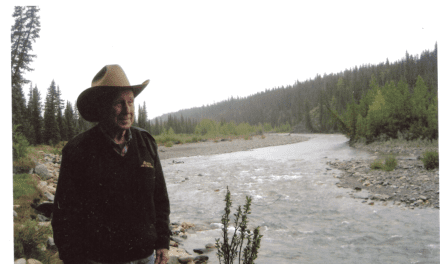

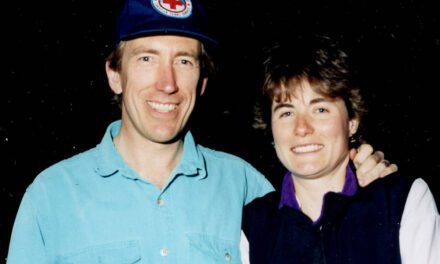
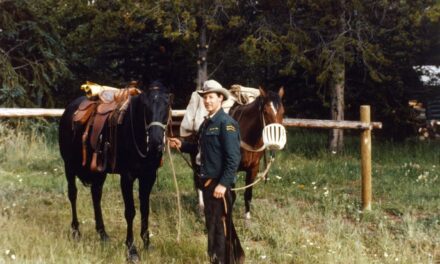
Rogers Pass …best NP assignments of my life.
Boy.. that was an excellent interview Gord.. I remember meeting you when my Dad was the head warden up in the Pass.. Don Beck.. my parents Don and Eleanore were friends with Ned and his wife.. I was a teenager 16 when we were transferred there. I remember the time you all went up to get that poor hiker with his face ripped off. I think he and his wife lived in Salmon Arm for awhile because I’ve seen him..and also her.. I have been trying to remember the names of the other wardens that worked up in the pass in 1971 and 72.. I used to know them all..Do you remember their names? We lived in the apartments with them until we moved over to the A frame house. Well I just wanted to let you know what a great time I had reading your adventures.. Happy Trails to You.. RL
Rae-Lynne,
Perhaps someone already responded privately to your note? Gord passed away in September 2022.
I see that no one has been able to help you with trying to remember the names of wardens that worked up in the pass in 1971 and 1972. I may be able to help just a little. I worked as a Park Warden at Roger’s Pass in the summer of 1981. At that time John Turnbull was the Chief Park Warden. Park Warden Bill Laurila worked with John out of the office in Revelstoke. Bruce MacKinnon was the Area Manager for Glacier Park. The other full-time wardens in Glacier were Stan Stachera, Phil Hammond, and Gord. I hope at least one of those names is familiar to you.
Dan Graham